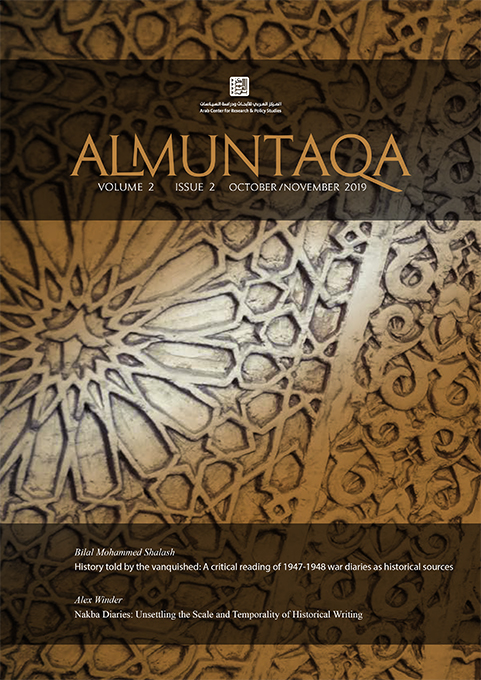
The Arab Center for Research and Policy Studies has published the fifth instalment of Almuntaqa — the peer-reviewed English-language journal dedicated to the social sciences and humanities, successfully rounding off its first year of publication. The journal continues to offer a range of studies and reviews published by the center and translated for English speakers.
The studies section opens with the article, "History Told by the Vanquished: A Critical Reading of 1947-1948 War Diaries as Historical Sources" by Bilal Mohammed Shalash. The article offers a critical reading of the historical texts dated back to the battles of the city of Jaffa during the war of 1947-1949. The study comparatively analyzes the texts of biographies and notes with archival documents narrated by the the garrison of Jaffa about the role it played in the trajectory of the battle. The researcher finds that "the most significant problem in these texts as sources in the history of the 1947 - 1949 War, particularly its first phase, is that they tend to take the form of lists of accusations or of defences." The second contribution is Alex Winder's " Nakba Diaries: Unsettling the Scale and Temporality of Historical Writing". The study focuses on the the Nakba-era diaries of Khalil al-Sakakini and Muhammad 'Abd al-Hadi al-Shrouf. Emphasis is placed on the significance of family and social networks; the production of space; affect and embodiment; and temporality in these two contrasting diaries. This paper deals with broader issues in terms of size and time and as they relate to the history of the Nakba, revealing the diversity of individual and societal disasters, which unfold and produce different experiences based on the lived spaces of Palestine.
This issue also includes a translation of Azmi Bishara's "Remarks on External Factors in Democratic Transition." Bishara finds in his study that "there is a major difference between the role of external factors in the transition process itself and their role in consolidating democracy after transition." The study also shows the relationship between the external factor and the geostrategic importance of the state in the Arab case. The study follows the development of the principle of "supporting democracy" in US policy, which remains linked to US interests, and in favour of the principle of regime stability, and monitors the regional and international trend of "autocracy promotion". The fourth study, "Actors, Structures and Qatari Foreign Policy" by Marwan Kabalan, argues that "the strategies adopted by the Qatari elite since 1995 did alleviate many of the structural constraints which the country would otherwise have faced." However, geopolitical factors are necessary for a state to continue playing a key role especially in a region where realpolitik continues to dominate the thinking of the elites. The final article, "Transformations of Manama: Equations of Demography, Islamization and Commercialization" by Nader Kadhim the many factors that led to the rapid urbanization of the Bahraini capital Manama, the subsequent influx of foreign workers and huge political transformations.
The next section, devoted to the Arab Opinion Index, features an article titled, "Public Opinion and The Army: The Cases of Algeria and Sudan." by Dana El Kurd, The study surveys respondents' opinions about democracy as a model for governance in Algeria and Sudan. Finally, this edition includes Baqer Alnajjar's review of Exporting Wealth and Entrenching Alienation: A History of Productive Imbalance in the Gulf States by Omar Hesham AlShehabi and Chamseddin Alkilani's review of The Caliphate State: Advancing Towards the Past, ISIL and the Local Community in Iraq by Faleh Abdel Jabbar.
All the articles are available to download open access from the Jstor website.